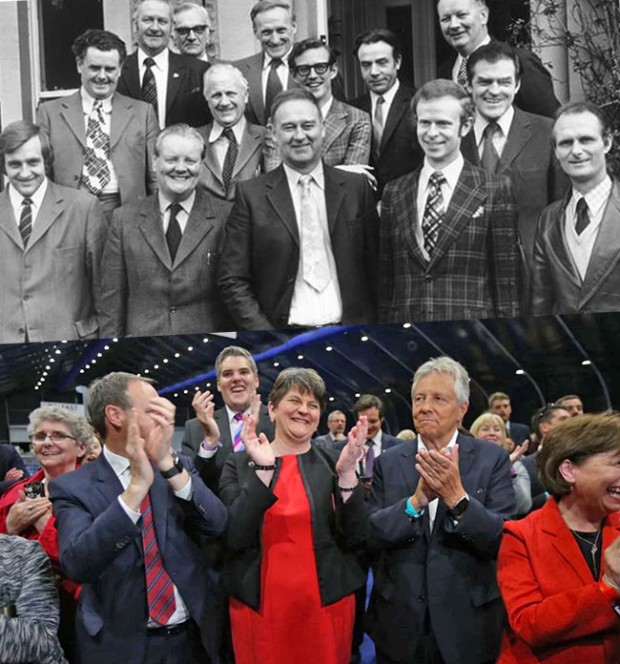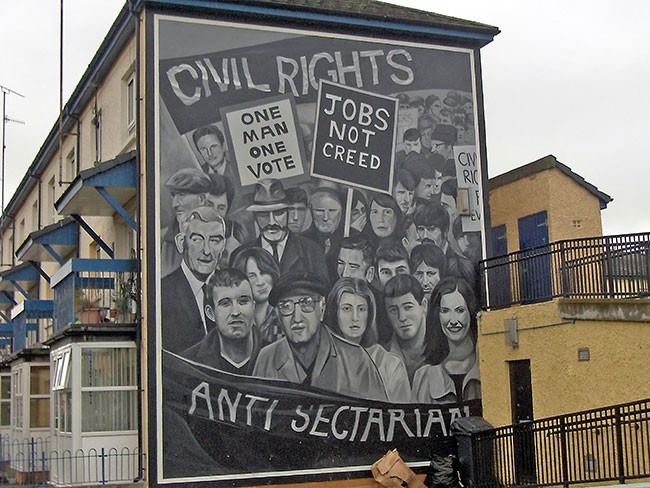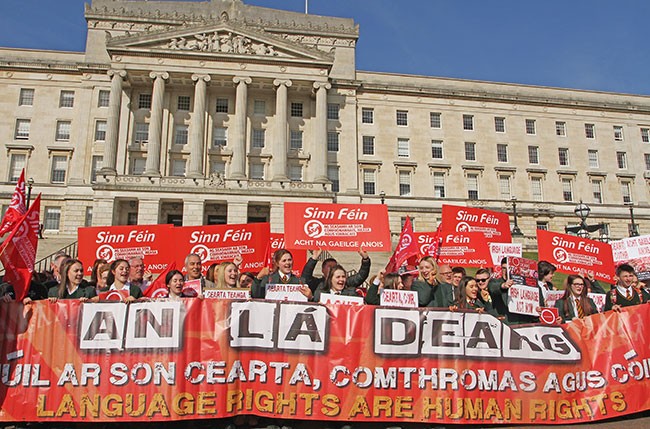1 September 2017
From Civil Rights to power-sharing – the DUP still doesn’t get it

• The faces of the unionist leadership at Stormont aren't the only changes – it's a different world today
This article first appeared in the monthly print version of An Phoblacht which is emailed immediately to online subscribers for just €10 for 12 issues
READING an article on the founding of the Civil Rights Association in the North in 1967, the oft-quoted dictum that “history repeats itself first as tragedy, second as farce” came to my mind.
The Civil Rights movement brought together human rights activists, trades unionists, republicans, nationalists, socialists, communists – and indeed liberal unionists – to formulate strategies and challenge the political corruption practised by the unionists in power at Stormont.
Observing the wreckage of the Northern Assembly and the shattered remnants of the political process in 2017, one could be forgiven for thinking that history is repeating itself 40 years later.
Successive Unionist Party governments who ruled the Six Counties from partition until 1972, when Stormont was abrogated by the British Government, denied citizens of the North their rights and equality.
Today, a recalcitrant unionism in the shape an arrogant, anti-equality and anti-Irish Democratic Unionist Party is behaving in the same manner as its unionist predecessors, a political methodology that compelled Martin McGuinness to resign his position as deputy First Minister in January. (See Martin’s resignation letter on below.)

Refusing to embrace change
Despite the intervening 50 years and the turbulent history we have all experienced, political unionism – of which the DUP is the vanguard – is still refusing to move forward and embrace change.
That constant, immovable obstacle is unionism, and Arlene Foster has been in the driving seat as leader of the DUP.
Arlene Foster lives near the stately home of another Fermanagh unionist, the infamous Lord Brookeborough. The then Captain Brooke (later to become Prime Minister) notoriously boasted to an Orange Order rally at Newtownbutler on 12 July 1933:
“There are a great number of Protestants and Orangemen who employ Roman Catholics. I feel I can speak freely on this subject as I have not had a Roman Catholic about my own place . . .
“I would appeal to loyalists, therefore, wherever possible, to employ good Protestant lads and lassies . . . I want you to remember one point in regard to the employment of people who are disloyal . . . You are disenfranchising yourselves in that way.
“You people who are employers have the ball at your feet. If you don’t act properly now, before we know where we are we shall find ourselves in the minority instead of the majority.”

• Derry mural tribute to the Civil Rights campaign against unionist discrimination in 'The Orange State'
Lord Brookeborough wouldn’t have a Catholic about his own place; it looks like his political descendants in Arlene Foster and the DUP don’t want Gaelgeoirs about the place – even though it’s no longer just their place.
But the fact that it is no longer ‘their place’ seems still to be hard for many unionists in the DUP and the once-dominant Ulster Unionist Party to accept.
It was a different world for unionism in 1967/68. It is a world that unionism looks back at longingly and hankers for a return to.
When the Northern Ireland Civil Rights Association (NICRA) was formally set up in 1967 it set out a number of demands for reforms. One of them was (in the vernacular of the time) “One Man, One Vote” -– the demand for a universal franchise for local government elections.
The North’s electoral system had a property franchise which granted votes in local elections only to those who owned property, weighted representation heavily in favour of unionism and disenfranchised nationalists, as did the business vote system for parliamentary elections. The result was that many towns and cities with a nationalist majority, even a substantial one, were unionist-controlled (examples included Derry City, Armagh, Dungannon and Enniskillen).
Electoral boundaries were carefully engineered in the interests of unionism. Belfast’s representatives in Stormont went from 4 to 16 in 1921; there was no increase in the nationalist representation and Belfast continued to return only one MP.
In the 1966 elections to the Westminster Parliament, the Ulster Unionist Party won 11 of the North’s 12 seats. Three years later, in the 1969 Stormont elections, 39 out of the 52 available seats (75%) went to the unionist candidates.
NICRA pressed for other reforms, including the end to discrimination in the allocation of housing and appointments to public sector jobs.
NICRA also wanted the repeal of the Special Powers Act and the disbandment of the Ulster Special Constabulary (the “B-Specials”), the paramilitary police reserve entirely Protestant in its make-up and renowned for the depth of its anti-Catholic bigotry.
Favouring unionism
While recent elections (most notably the March Assembly election when Sinn Féin came within a hairs’ breadth of besting the DUP) demonstrated that the demographic picture is changing the North, the reality is that the old boundaries still favour unionism.
On the housing front, a report published in June by the North’s Equality Commission (ECNI) showed that Catholics are waiting six months longer than Protestants for social housing.
According to the report, social housing waiting lists for 2004 to 2009 and for 2013/14 show that Catholics experienced “the longest median waiting times for social housing at the point of allocation in Northern Ireland”.

• Irish-language campaigners take their call to the steps of Stormont in the face of DUP opposition
Between 2004 and 2009, the average waiting list time for Catholic households was eight months, compared with six months for “other religion” households and six months for Protestants. But by 2013/14 the wait had nearly doubled for Catholics to 15 months, while “other religion” households had more than doubled to 13 months. The wait for Protestants had increased by a third, to nine months.
The longest wait for Catholics was in west Belfast (28 months) followed by 27 months in south Belfast, 22 months in Ballymena and 15 in east Belfast.
The 2011 Census figures confirm that Catholics are still more likely to be unemployed than Protestants.
While these significant trends in housing allocation and unemployment figures may resonate more with the ‘civil rights generation’, contemporary issues such as the Renewable Heat Incentive scandal, Arlene Foster’s sardonic description of the Irish-language campaign as a “crocodile”, the continued refusal of the DUP to embrace the equality agenda by blocking marriage equality, and the DUP’s continued hardline strategy over legacy issues have their roots in a unionist intransigence that has stonewalled political progress over many, many years.
But bad history doesn’t have to repeat itself.
If former DUP leaders Ian Paisley and Peter Robinson could have a professional, working relationship with the leader of Sinn Féin in the Executive (despite their history), what is it about Arlene Foster and her lieutenants that they feel they could treat with disdain the unfailingly generous Martin McGuinness in particular, Sinn Féin as a party and the republican and nationalist community in general?
Follow us on Facebook
An Phoblacht on Twitter
Uncomfortable Conversations

An initiative for dialogue
for reconciliation
— — — — — — —
Contributions from key figures in the churches, academia and wider civic society as well as senior republican figures





